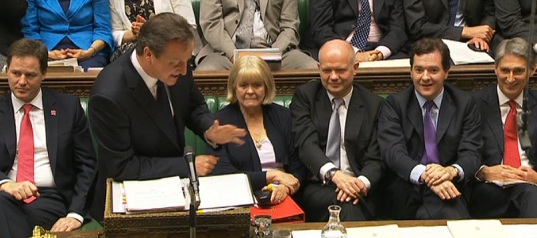How does Cameron finesse the Lords Reform standoff?

And can he stop intra-coalition spats becoming more frequent?
No-one said government was easy, and coalition governments bring even more challenges for their leadership. This week’s substantial Tory backbench rebellion on Lords reform and consequent government concession on the timetable was another sign of the increasing fractiousness within the Tory-Lib Dem coalition, as was the inevitable response from disgruntled Lib Dems.
The immediate problem for the government is how it can hold good to its implied commitment within the Coalition Agreement to enact reform of the House of Lords, an aim that both governing parties had within their manifestoes (as did Labour).
-
Although the Agreement only committed the parties to setting up a committee to investigate and report back, there’d have been no point doing so were there not the intent to take those proposals forward in legislation, particularly given the manifestoes the parties stood on.
By the same token, the boundary review process only committed the parties to the process, not the specifics – a point Lib Dems are increasingly making.
One consequence of the Tory backbench rebellion however is on the relative timetables of Lords reform and the implementation of new boundaries. The new boundaries have to be voted on by October next year. Without the Programme Motion, that makes it pretty much impossible to force through the Lords reform before then, even if the government has to use the Parliament Act, which opposition in the Lords may well mean it will have to.
That matters because the party whose policy is voted on first has a substantial tactical advantage. It is far harder to threaten to vote against something if your own preferred policy can itself be held hostage.
To that end, Cameron may have to simply take the days and days of debate on Lords reform on the chin. It’s not a subject the public cares about and they may well be confused as to why parliament will spend so much time navel-gazing but he can at least console himself that at least it’s another party’s obsession that’s tying things up. It could be worse; it could be the EU.
As an aside, as Mike noted earlier this week, the Lib Dems wouldn’t do too badly were Lords reform to be lost – the Coalition Agreement would give them a majority-making position in the Lords (providing the cross-benchers don’t act more-or-less in unison), and certainly more representation than they’d win in an election as things stand.
That consolation ought to act as a mitigating factor if the reform is ultimately lost (and there are strong arguments that while democratisation of the Upper House is desirable, these specific proposals are not). On the other hand, politicians are activists and idealists and don’t always act so coolly when they think their cherished beliefs are thwarted underhandedly.
Despite all that, Cameron must be aware that the biggest threat has so far come from his own side. The major rebellions might have been on relatively trivial matters – technical votes or divisions with no lasting implications – but from Tories all the same. Keeping them happy (or at least, not irking them excessively) could well be the most crucial factor in seeing the parliament through the full five years. After all, there’s a reason the Tory backbenchers club is called the 1922 Committee.